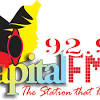Listeners:
Top listeners:
-
play_arrow
Kapital FM 92.9 The Station that Rocks!

The Central Bank of Nigeria CBN, has blamed the free-fall of the naira on the huge sum of $40 billion spent by Nigerians on foreign education and medical tourism in the last 10 years.
The CBN Governor Mr. Olayemi Cardoso made this clarification while giving insight into the constant depreciation of the value of the Naira as against the United States Dollar, creating a volatile exchange rate for the country.
According to him, the trend is caused by a decline in the supply of US Dollars amid the high demand for the currency to pay for foreign services in the education, health and other sectors.
The CBN governor who stated this at the sectoral debate organised by the House of Representatives, said Nigeria has spent $40 billion on school and medical tourism in 10 years, putting pressure on the Naira, causing it to keep depreciating.
Cardoso explained that foreign education expenses amounted to $28.65 billion while medical treatment abroad incurred about $11.01 billion.
“Given this data, it’s crucial to highlight that between 2010 and 2020, foreign education expenses amounted to a substantial US$28.65 billion, as per the CBN’s publicly available Balance of Payments Statistics
“Similarly, medical treatment abroad has incurred around US$11.01 billion in costs during the same period. Consequently, over the past decade, foreign exchange demand for education and healthcare has totalled nearly US$40 billion.
“Notably, this amount surpasses the total current foreign exchange reserves of the CBN, Mitigating a significant portion of this demand could have resulted in a considerably stronger Naira today.
“Personal Travel Allowances have accounted for a total of US$58.7 billion during the same period. Notably, between January and September 2019, the CBN disbursed US$9.01 billion to Nigerians for personal foreign travel”.
“Continuing on the topic of the demand for US Dollars, Nigeria’s annual imports, which require dollars for payment, amounted to US$16.65 billion in 1980″.
“By 2014, the annual import expenditure had significantly surged to US$67.05 billion, although it gradually decreased to US$54.71 billion as of last year. Similarly, food imports escalated from US$2.63 billion in 1980 to US$14.84 billion in 2019,”Cardoso said.
According to him, while inflation pressures may persist, albeit temporarily, they are expected to moderate significantly by Q4 2024, with exchange rate pressures also expected to reduce with the smooth functioning of the foreign exchange market.
Cardoso noted that while the CBN has the mandate of stabilizing the exchange rate, achieving results would necessitate efforts beyond the bank itself and indeed to an attitudinal change of all citizens.
On the relocation of some departments of CBN to Lagos State, Cardoso explained that the decision was not political but only an implementation of what had been done before now.
Oduyemi Odumade, Edited By Grace Namiji
Written by: Editorial Team
#kapitalfm92.9 CBN Medical Tourism
Similar posts
Recent Posts
- 98℅ Completion Of Road Projects, A Promise Kept – Wike
- NHFSS Commissions Office Complex In Idu Abuja
- Mohbad’s Father Confirms Pasting Summons for DNA Test on Daughter-In-Law’s Gate
- Encouraging Creativity, Innovation For National Development
- Environmental Advocate Harps On Proactive Measures To Mitigate Flooding
Recent Comments
No comments to show.Top popular
Chart
-
-
play_arrow
Sunshine Tommy Blues
-
play_arrow
-
-
play_arrow
Red Frank Lee
-
play_arrow
-
-
play_arrow
Eclipse Donna May
-
play_arrow
-
Copyright Kapital FM 92.9 Abuja - The Station that Rocks!










Post comments (0)